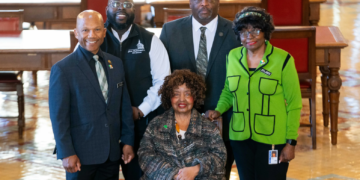Feb 11, 2025 Story by: Editor
NEW YORK (AP) — PBS has announced the closure of its diversity, equity, and inclusion (DEI) office to align with an executive order issued by former President Donald Trump. As a result, the network is terminating the positions of Cecilia Loving and her associate, Gina Leow, who were hired when the initiative began in 2021.
The decision comes at a time when public television and radio are preparing for what could be their most significant federal funding battle in years.
Despite dissolving the DEI office, PBS CEO Paula Kerger reassured that “we were committed to telling the stories of all Americans before we had an office, and will continue to do it afterwards.”
PBS receives federal funding through the U.S. Department of Education and the National Science Foundation, particularly for its children’s programming. According to Kerger, legal experts determined that compliance with Trump’s executive order was necessary. The network receives approximately $535 million in federal support—around 16% of its total budget—but because the funding is distributed through the Corporation for Public Broadcasting (CPB), the requirement for compliance remains uncertain.
PBS consists of 330 member stations, some of which have their own DEI initiatives and receive CPB funding. Kerger stated that these stations will need to determine independently how to proceed. “We’re trying to encourage them to have lawyers look at their circumstances,” she told The Associated Press.
According to The Free Press, PBS initially considered reassigning Loving and Leow to other positions but ultimately decided against it.
The DEI office’s work extended beyond racial equity, with recent efforts focused on ensuring accessibility to PBS programming for children with hearing impairments, Kerger noted.
PBS has previously faced scrutiny regarding diversity. Four years ago, over 130 filmmakers criticized the network’s relationship with documentarian Ken Burns, arguing it came “at the expense of others” and demonstrated “a systemic failure to fulfill a mandate for a diversity of voices.”
Now, with the Trump administration aiming to cut federal spending, public broadcasting faces renewed scrutiny. U.S. Senator Mike Lee voiced his stance on X, stating, “let’s defund PBS and NPR.” Calls to defund PBS are not new, as Republican lawmakers have long argued that its news programming leans left. However, such efforts have historically failed due to opposition from lawmakers who recognize the network’s value across the country.
Kerger and NPR officials are set to testify before the House Oversight and Government Reform Committee next month.
“I think it is different this time because so much is under scrutiny,” Kerger said. “I never assume that government funding will continue. I think we have to work hard each and every time these questions come up to make sure we are making the case of why this is important.”
She acknowledged that public perception of media bias is a growing issue, noting that some audiences see news coverage as too conservative, while others find it too liberal. “We take that part of our work pretty seriously and if we miss sometime, we correct that,” she said.
Kerger emphasized the critical role of local stations in providing vital information, such as coverage of California wildfires and hurricanes in Florida—issues lawmakers should consider in funding discussions.
“I’m always an optimistic person,” Kerger concluded, “but I think it’s going to require a lot of conversations to see if we can hold on to a level of funding to enable our stations to continue.” Source: WBOC

















